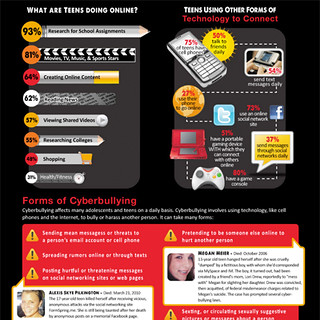By Carl Weiss
Like it or not, the age of
the cyber stalker is upon us. Whether
you are an employee, are married or have just ended a relationship, there are
apps that make it all too easy for a third party to know a great deal of
intimate personal knowledge about you.
Worse still is the fact that for a few bucks any cyberstalker can acquire a sophisticated array of software that makes it child’s play to track your
location in real time and listen or look in on what you are doing and with whom you
are doing it.
| Cyber-Bullying-Infographic (Photo credit: Social Media Max) |
While this sounds like a plot
for a sci-fi movie or novel it has become all too real for victims of this
twenty-first century scourge. During the
past few months everyone from ex-boyfriends to a Seattle police officer have
been prosecuted for spying on and/or posting sexually explicit photos of their
former lovers online. Even children have
been portrayed recently in the media for using the Internet to cyberbully
classmates with sometimes tragic results.
The bad news is that in
spite of recent legislation that can impose serious jail time on cyberstalkers,
this is a crime that is on the rise, currently affecting one in six women and
ten percent of all men. The good news is
that there are steps that you can take to defend yourself in this all too wired
world.
Is Facebook Becoming Cyberstalker Central?
The newspost that motivated
me to write this blog is entitled, “7 Things You Told Facebook Without
 Realizing It.” Posted on April 29 by
vox.com, the staggeringly detailed post details a number of creepy apps that
are available to the general public that are designed to trawl through Facebook
to guess your income, your location and your passwords, to apps that seek out
men or women who have just ended a relationship or even scout the social net
for revealing photos. Like a virus, some
of these apps are designed to jump from one post to another, burrowing into
your list of friends in order to do the stalkers nefarious deeds.
Realizing It.” Posted on April 29 by
vox.com, the staggeringly detailed post details a number of creepy apps that
are available to the general public that are designed to trawl through Facebook
to guess your income, your location and your passwords, to apps that seek out
men or women who have just ended a relationship or even scout the social net
for revealing photos. Like a virus, some
of these apps are designed to jump from one post to another, burrowing into
your list of friends in order to do the stalkers nefarious deeds.
Of course Facebook isn’t the
only social net in vogue with cyberstalkers.
And not all cyber stalkers are interested in seeing your swimsuit
photos. A post from technorati.com points
out that Facebook, Twitter and FourSquare are now being used by burglars to
zero in on vacationing families. The
article points out that not only do 75% of convicted burglars admit that
criminals use social media to find homes to victimize, but they also admit to
using Google Earth to case the neighborhood.
(Let’s see the neighborhood watch foil these hi-tech thieves.)
 The problem with most people
is that they post way too much information on social sites. Everything from where you
live to what you own is many times revealed in stunning detail (complete with
photos). Then you casually post the fact
that you are going to be leaving on that two week vacation and let everyone in
cyberspace not only know how long you will be gone, but you also share photos
of you at the airport waiting on your plane to pix of your vacation in real
time. If this sounds familiar, then don’t
be surprised if upon your return you find that your house and/or business has
been rifled by thieves. (Heck why not show the thieves where you keep the spare
key?)
The problem with most people
is that they post way too much information on social sites. Everything from where you
live to what you own is many times revealed in stunning detail (complete with
photos). Then you casually post the fact
that you are going to be leaving on that two week vacation and let everyone in
cyberspace not only know how long you will be gone, but you also share photos
of you at the airport waiting on your plane to pix of your vacation in real
time. If this sounds familiar, then don’t
be surprised if upon your return you find that your house and/or business has
been rifled by thieves. (Heck why not show the thieves where you keep the spare
key?)
The Technorati piece goes
onto advise readers that if they don’t want to be victimized while on vacation
they need to start by taking a vacation from using social media before or
during any extended trip. They also
advise you to consider sharing your vacation photos after the fact. The article also advises the public to advise
their friends to avoid posting tidbits about them while they are on vacation unless
it is to post the fact that you have just acquired a vicious watchdog.
You Always Hurt the One You Love
Even software that was
originally purposed to protect those we love can be coopted into working for
the bad guys. A blog on Motherboard.com
points out the fact that spy software designed to help mothers keep
tabs on their children has become popular fodder for those who wish to spy on
others.
"We
do have quite a large proportion of our customers who use mSpy specifically to
catch a cheating spouse," mSpy communications director Tatiana Ameri told Komo News last year. http://motherboard.vice.com/read/tor-is-being-used-as-a-safe-haven-for-victims-of-cyberstalking
More illuminating is the fact
that the article goes onto point out that there is an entire online realm that caters to those looking to spy on others.
"Digital communities have
sprung up where individuals teach each other how to compromise cell phones to
track victim’s whereabouts, listen to conversations in a room, take pictures,
and read texts and email so that they can learn about their victim’s behavior
on a microscopic level."
Even Spies Have Girlfriends
The piece also goes onto point out that even spies at the NSA aren’t above using top secret surveillance tools to keep tabs on loved ones. The program was so pervasive that it even had its own codename: LOVEINT. The revelation of this peccadillo so incensed Senator Chuck Grassley of Iowa that he petitioned the NSA to release information about LOVEINT. The information revealed that at least a dozen of the NSA’s best and brightest were implicated in the program.
Of course for every spy there
is a counterspy. And in the age of
cyberstalking there are a number of resources designed to help victims fight
back. While many of these sites provide
checklists designed to help you avoid becoming a victim of cyberstalkers, there
are a few that take a more proactive approach.
One of these is Tor Network, the same software employed by hackers,
crackers, dissidents and whistleblowers to maintain online anonymity.
For several
years, Tor, spearheaded by Tor Project executive director Andrew Lewman, has been tackling cyber stalking, working
with domestic violence groups to set up countersurveillance
programs to help
victims evade online surveillance. The onion router can hide a victim’s
identity long enough for them to research where to find help, and look up
what data they can find about themselves without tipping off their stalker that
they’re online, he said.
Remember that everything from
your computer to your tablet and smartphone can be used against you. Malware can be surreptitiously installed on
any or all of these that can allow a cyberstalker to take control of the device
even to the point of activating the unit’s webcam. So aside from making sure you have one or
more layers of software designed to detect and defeat spyware and malware also
make sure that you don’t make it easy for cyberstalkers to get you in their clutches. Never click on links or email from people you
do not know. Curtail your habit of
sharing everything and anything about your personal life online. Above all, be wary of posting any photos that
could be used against you at a later date.
Hey! Anybody want to see a picture of my new Rottweiler?
Carl Weiss is CEO of Working the
Web to Win, a digital marketing agency in Jacksonville, Florida.
You can interface with Carl every Tuesday at 4 p.m. Eastern when he airs
his radio show on Blog
Talk Radio.




In today's internet dependent and connected world, everyone has a responsibility to make sure they set up safeguards to protect this personal information. Those who don't will eventually suffer.
ReplyDeleteI'm eager to read and research the additional info you provided. Thanks!
ReplyDeleteOnce again, WWW raises some thought-provoking issues while provide sage and pragmatic advice. Read and take heed, everyone.
ReplyDelete